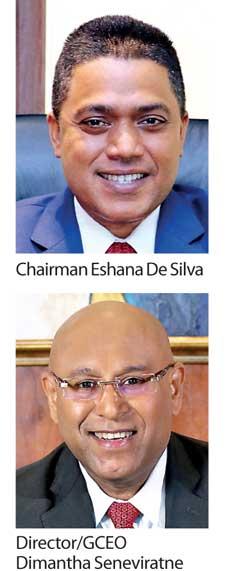21 May 2020 - {{hitsCtrl.values.hits}}
National Development Bank PLC’s (NDB) operating profits held steady during the three months to March 31, 2020, despite the pressure on margins and higher credit costs stemming from the coronavirus-linked additional provisions against possible bad loans.

Lower effective tax, resulted from the absence of the Nation Building Tax (NBT) on financial services and Debt Repayment Levy (DRL), helped the bank to have its bottom line pushed higher by 23 percent, as the banking sector earnings received a windfall from the tax cuts introduced by the new government last year. The development bank-turned retail lender said it got off to a solid start with Rs.15.5 billion new loans and Rs.9.1 billion new deposits until mid-March, before the economy grounded to a halt, due to the coronavirus-induced curfews.
The bank with assets of Rs.553.3 billion reported net interest incomes of Rs.4.4 billion, down 7 percent from the year earlier period, due to the increase in interest expenses stemming from the quoted debentures issued in the same quarter in the year ago while the margins came under pressure from the regulator-induced decline in market interest rates.
The bank reported an operating profit of Rs.2.47 billion for the three months, compared to Rs.2.59 billion in the year earlier period, a decline of 5 percent.
Fee and commission incomes were 15 percent higher at Rs.1.2 billion, as the fees generated from new loans, deposits and in particularly the digital channels, which saw a strong uptake with the customers mostly doing their banking via online channels, being under shelter-in-place conditions.
NDB Director/Group CEO Dimantha Seneviratne weighed on digital banking as the way forward and the new normal in the post-coronavirus Sri Lanka.
“…the economic toll from the COVID-19 pandemic will further deepen in the coming quarters and remain for years ahead,” he said.
He added, “Digital banking will be the norm in the ‘new normal’ in the aftermath of the pandemic and NDB is at a strong position in this aspect with the bank’s dynamic digital banking avenues, particularly the upgraded NDB NEOS mobile banking and online banking options, which saw a surge in transactions and volumes recently.”
As banks were scrambling to contain their higher operational costs, mostly fixed in nature such as maintaining a wider network of brick-and-mortar branches, they are now making attempts to lock in the new norm surrounding digital banking with significantly less operational costs after the initial outlay.
“We will revisit our business model, revise future forecasts and realign strategic resources in pursuit of sound returns delivered to all our stakeholders in the coming months and beyond, whilst placing digitisation at core,” Seneviratne said.
Meanwhile, the bank further reduced its cost-to-income ratio to 36.5 percent, from 39.9 percent at the end of last year. The bank attributed the lower ratio to wide-ranging automation actives carried out during 2018 and 2019.
NDB made impairment provision of Rs.1.28 billion in March 2020, compared to Rs.955.9 million in the year earlier period, which was partly in line with the growth in new loans and some higher provisions made against certain individual loans considering elevated risks due to stressed market conditions.
The bank reported earnings of Rs.5.34 a share or Rs.1.24 billion for the January-March 2020 quarter, compared to Rs.4.02 a share or Rs.1.0 billion in earnings in the year earlier period, on the absence of the NBT and DRL.
The government effectively owns of 33.96 percent of NDB Bank through the Employees’ Provident Fund, Bank of Ceylon, Sri Lanka Insurance Corporation and the Employees’ Trust Fund.
17 Nov 2024 2 hours ago
17 Nov 2024 2 hours ago
17 Nov 2024 2 hours ago
17 Nov 2024 4 hours ago
17 Nov 2024 4 hours ago